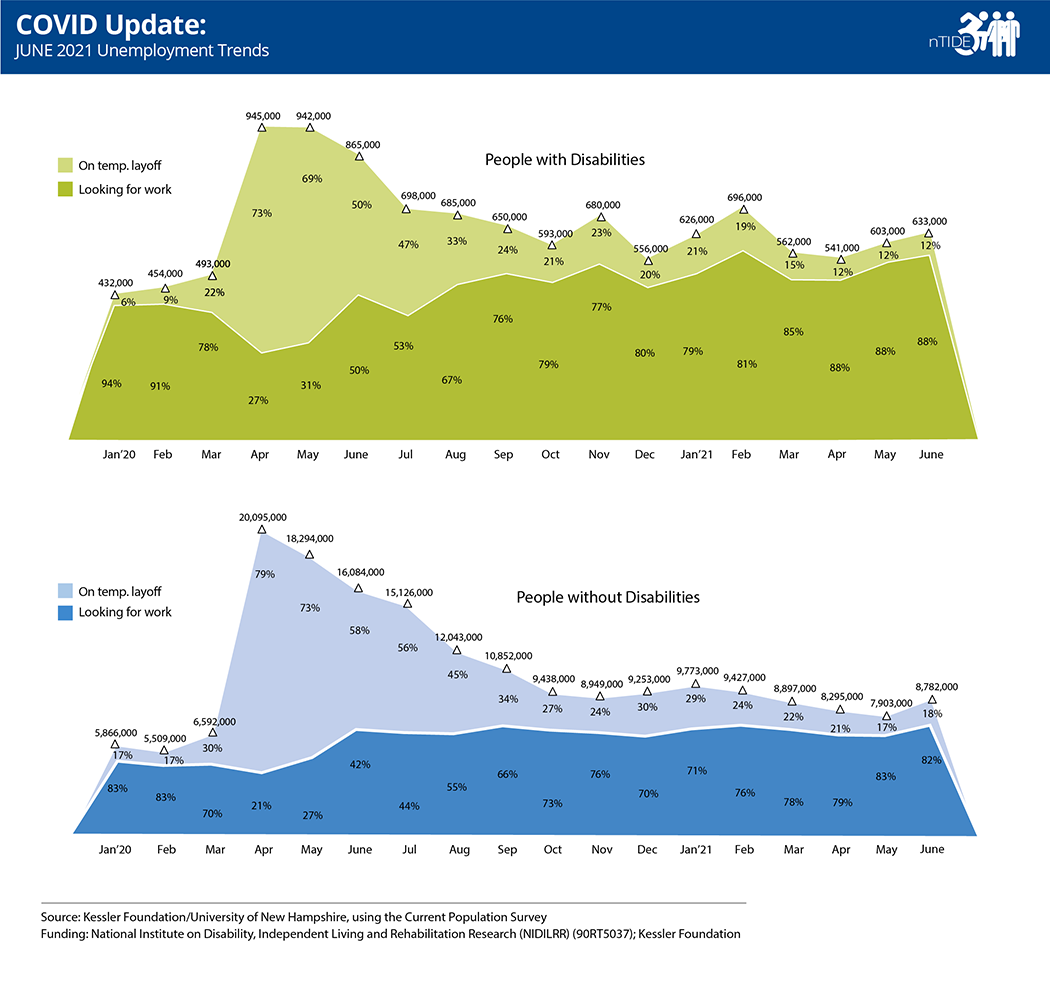nTIDE June 2021 COVID Update: Unemployment numbers stabilizing at higher than pre-pandemic numbers
National Trends in Disability Employment (nTIDE) – issued semi-monthly by Kessler Foundation and the University of New Hampshire
This graphic compares the impact of the COVID-19 pandemic on people with and without disabilities, capturing pre-pandemic and current unemployment data for January 2020 to June 2021. The main takeaway is that while unemployment continues to decline, levels remain well above pre-pandemic levels.
East Hanover, NJ. July 26, 2021. For two consecutive months, the number of people unemployed has increased, according to today’s National Trends in Disability Employment (nTIDE) COVID Update, as economic recovery continues to face the ongoing challenges of the pandemic.
The COVID-19 pandemic precipitated an unprecedented rise in furloughs and people looking for work, prompting the addition of this mid-month nTIDE COVID Update in the spring of 2020. The mid-month nTIDE follows two key unemployment indicators – furloughs, or temporary layoffs, and the number of people looking for work, comparing trends for people with and without disabilities.
June’s nTIDE COVID Update graphic shows that the number of unemployed people with and without disabilities has stabilized, but at levels higher than pre-pandemic levels, according to economist Andrew Houtenville, PhD, research director of the University of New Hampshire Institute on Disability, and co-author of nTIDE. The levels are substantial, with increments of 200,000 for people with disabilities, and approximately 3 million for people without disabilities, indicating that many people have not yet returned to the labor market.
Dr. Houtenville pointed out the sharp contrast with past trends: “This time of the year is traditionally the height of the summer hiring season, but in 2021, we are not seeing the usual impact of seasonal jobs for May and June. Delayed rebound in the entertainment and dining sectors may be one of the factors, and some workers may still be hesitant to return due to safety concerns.”
Data for June show that furloughs continue at relatively low levels, approaching pre-pandemic levels, a positive sign for people with and without disabilities. Public health concerns, however, warrant caution. “Spread of the delta variant, which is more contagious and causes more serious illness, could trigger lockdowns in areas of the country where vaccination rates are low,” Dr. Houtenville noted. “If that occurs, we may see an increase in furloughs.”
Notes from the Field
Disability employment expert John O’Neill, PhD, shared the experiences of a vocational service provider that is working to maintain jobs for workers with disabilities. Dr. O’Neill, director of the Center for Employment and Disability Research at Kessler Foundation, sits on the board of Job Path NYC , a New York City-based nonprofit that provides customized employment services for people with autism and developmental disabilities. In December 2020, 70 out of 250 of Job Path’s clients were furloughed. The subsequent rate of return to work has been slow, with 42 out of 250 clients still waiting to be called back in July.
Many of these workers have jobs in theaters, schools, and restaurants, which are slowly reopening, which may contribute to prolonged furloughs. Another factor relates to the structure of customized placements. “These jobs often rely on supports across an organization, which may be harder to restart, especially when workplaces are undergoing radical changes.”
Dr. O’Neill cautioned against extrapolating these observations, emphasizing that customized employment involves a minority of workers with disabilities. Regardless of employment type, Drs. Houtenville and O’Neill agreed on the importance of early intervention when workers with disabilities lose their jobs. “The longer they are disconnected from their employer, the harder it is to re-enter the workforce,” said Dr. Houtenville. “State programs that emphasize rapid response to job loss are good resources for helping return-to-work and stay at work,” added Dr. O’Neill.
As the economy evolves, Dr. O’Neill pointed out the prospects for different types of jobs. “By maintaining their connections to employers, workers with disabilities will be better positioned to take advantage of new opportunities in the workplace.”
Register for next month’s nTIDE webinars: August 6, 2021, nTIDE Jobs Report, and our August 20, 2021, COVID Update at https://researchondisability.org/home/ntide
This COVID Update is an extra edition of National Trends in Disability Employment (nTIDE), a joint project of Kessler Foundation and the University of New Hampshire Institute on Disability, co-authored by Dr. Houtenville and John O'Neill, PhD, of Kessler Foundation. The nTIDE team closely monitors the job numbers, issuing semi-monthly nTIDE reports, as the labor market continues to reflect the many challenges of the pandemic.
Funding: Kessler Foundation and the National Institute on Disability, Independent Living and Rehabilitation Research (NIDILRR) (90RT5037)
About Kessler Foundation
Kessler Foundation, a major nonprofit organization in the field of disability, is a global leader in rehabilitation research that seeks to improve cognition, mobility, and long-term outcomes -- including employment -- for people with neurological disabilities caused by diseases and injuries of the brain and spinal cord. Kessler Foundation leads the nation in funding innovative programs that expand opportunities for employment for people with disabilities. For more information, visit KesslerFoundation.org.
About the Institute on Disability at the University of New Hampshire
The Institute on Disability (IOD) at the University of New Hampshire (UNH) was established in 1987 to provide a coherent university-based focus for the improvement of knowledge, policies, and practices related to the lives of persons with disabilities and their families. For information on the NIDILRR-funded Employment Policy and Measurement Rehabilitation Research and Training Center, visit ResearchonDisability.org.
For more information, or to interview an expert, contact Carolann Murphy:
973.324.8382
